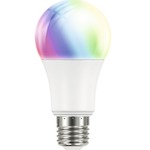| title | description | addedAt | pageClass |
|---|---|---|---|
HORNBACH 10011725 control via MQTT |
Integrate your HORNBACH 10011725 via Zigbee2MQTT with whatever smart home infrastructure you are using without the vendors bridge or gateway. |
2020-02-26 17:45:15 UTC |
device-page |
| Model | 10011725 |
| Vendor | HORNBACH |
| Description | FLAIR Viyu Smart LED bulb RGB E27 |
| Exposes | light (state, brightness, color_temp, color_temp_startup, color_xy), effect, linkquality |
| Picture |  |
How to use device type specific configuration
-
color_sync: Synchronizes the color values in the state, e.g. if the state containscolor_tempandcolor.xyand thecolor_tempis set,color.xywill be updated to match thecolor_temp. (default:true) -
transition: Controls the transition time (in seconds) of on/off, brightness, color temperature (if applicable) and color (if applicable) changes. Defaults to0(no transition). Note that this value is overridden if atransitionvalue is present in the MQTT command payload. -
hue_correction: (optional) Corrects hue values based on a correction map for matching color rendition to other lights. Provide a minimum of 2 data sets in the correction map. To build a map:- choose one of your other lights to be the color reference
- send a sample color to both lights (reference and non-reference)
- modify hue value for non-reference light until it color matches the reference light
- take note of the in and out values, where
inis the hue value you sent to your reference lightoutis the hue value you had to dial your non-reference light to
- repeat with a few other sample colors (4-5 should suffice)
Example correction map:
hue_correction: - in: 28 out: 45 - in: 89 out: 109 - in: 184 out: 203 - in: 334 out: 318
This light supports the following features: state, brightness, color_temp, color_temp_startup, color_xy.
state: To control the state publish a message to topiczigbee2mqtt/FRIENDLY_NAME/setwith payload{"state": "ON"},{"state": "OFF"}or{"state": "TOGGLE"}. To read the state send a message tozigbee2mqtt/FRIENDLY_NAME/getwith payload{"state": ""}.brightness: To control the brightness publish a message to topiczigbee2mqtt/FRIENDLY_NAME/setwith payload{"brightness": VALUE}whereVALUEis a number between0and254. To read the brightness send a message tozigbee2mqtt/FRIENDLY_NAME/getwith payload{"brightness": ""}.color_temp: To control the color temperature (in reciprocal megakelvin a.k.a. mired scale) publish a message to topiczigbee2mqtt/FRIENDLY_NAME/setwith payload{"color_temp": VALUE}whereVALUEis a number between150and500, the higher the warmer the color. To read the color temperature send a message tozigbee2mqtt/FRIENDLY_NAME/getwith payload{"color_temp": ""}. Besides the numeric values the following values are accepected:coolest,cool,neutral,warm,warmest.color_temp_startup: To set the startup color temperature (in reciprocal megakelvin a.k.a. mired scale) publish a message to topiczigbee2mqtt/FRIENDLY_NAME/setwith payload{"color_temp_startup": VALUE}whereVALUEis a number between150and500, the higher the warmer the color. To read the startup color temperature send a message tozigbee2mqtt/FRIENDLY_NAME/getwith payload{"color_temp_startup": ""}. Besides the numeric values the following values are accepected:coolest,cool,neutral,warm,warmest,previous.color_xy: To control the XY color (CIE 1931 color space) publish a message to topiczigbee2mqtt/FRIENDLY_NAME/setwith payload{"color": {"x": X_VALUE, "y": Y_VALUE}}(e.g.{"color":{"x":0.123,"y":0.123}}). To read the XY color send a message tozigbee2mqtt/FRIENDLY_NAME/getwith payload{"color":{"x":"","y":""}}. Alternatively it is possible to set the XY color via RGB:{"color": {"r": R, "g": G, "b": B}}e.g.{"color":{"r":46,"g":102,"b":150}}{"color": {"rgb": "R,G,B"}}e.g.{"color":{"rgb":"46,102,150"}}{"color": {"hex": HEX}}e.g.{"color":{"hex":"#547CFF"}}
For all of the above mentioned features it is possible to do a transition of the value over time. To do this add an additional property transition to the payload which is the transition time in seconds.
Examples: {"brightness":156,"transition":3}, {"color_temp":241,"transition":1}.
Instead of setting a value (e.g. brightness) directly it is also possible to:
- move: this will automatically move the value over time, to stop send value
stopor0. - step: this will increment/decrement the current value by the given one.
The direction of move and step can be either up or down, provide a negative value to move/step down, a positive value to move/step up.
To do this send a payload like below to zigbee2mqtt/FRIENDLY_NAME/set
NOTE: brightness move/step will stop at the minimum brightness and won't turn on the light when it's off. In this case use brightness_move_onoff/brightness_step_onoff
{
"brightness_move": -40, // Starts moving brightness down at 40 units per second
"brightness_move": 0, // Stop moving brightness
"brightness_step": 40 // Increases brightness by 40
"color_temp_move": 60, // Starts moving color temperature up at 60 units per second
"color_temp_move": "stop", // Stop moving color temperature
"color_temp_step": 99, // Increase color temperature by 99
}Triggers an effect on the light (e.g. make light blink for a few seconds).
Value will not be published in the state.
It's not possible to read (/get) this value.
To write (/set) a value publish a message to topic zigbee2mqtt/FRIENDLY_NAME/set with payload {"effect": NEW_VALUE}.
The possible values are: blink, breathe, okay, channel_change, finish_effect, stop_effect.
Link quality (signal strength).
Value can be found in the published state on the linkquality property.
It's not possible to read (/get) or write (/set) this value.
The minimal value is 0 and the maximum value is 255.
The unit of this value is lqi.